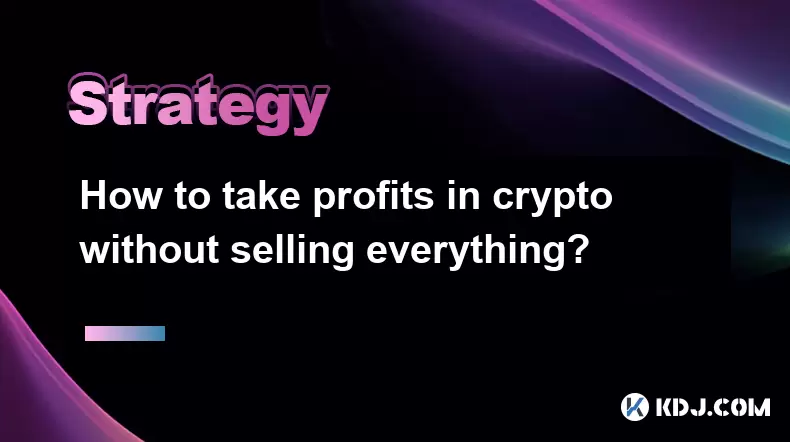-
 bitcoin
bitcoin $87959.907984 USD
1.34% -
 ethereum
ethereum $2920.497338 USD
3.04% -
 tether
tether $0.999775 USD
0.00% -
 xrp
xrp $2.237324 USD
8.12% -
 bnb
bnb $860.243768 USD
0.90% -
 solana
solana $138.089498 USD
5.43% -
 usd-coin
usd-coin $0.999807 USD
0.01% -
 tron
tron $0.272801 USD
-1.53% -
 dogecoin
dogecoin $0.150904 USD
2.96% -
 cardano
cardano $0.421635 USD
1.97% -
 hyperliquid
hyperliquid $32.152445 USD
2.23% -
 bitcoin-cash
bitcoin-cash $533.301069 USD
-1.94% -
 chainlink
chainlink $12.953417 USD
2.68% -
 unus-sed-leo
unus-sed-leo $9.535951 USD
0.73% -
 zcash
zcash $521.483386 USD
-2.87%
How to take profits in crypto without selling everything?
Strategic profit-taking in crypto, like partial selling and trailing stops, lets investors lock in gains while keeping upside potential alive.
Jul 15, 2025 at 05:49 pm

Understanding Profit-Taking in the Crypto Market
Taking profits in cryptocurrency doesn't necessarily mean selling your entire position. Many traders and investors aim to secure gains while still maintaining exposure to potential future price increases. The key lies in understanding how to strategically manage your portfolio without liquidating all holdings. This approach is especially useful for those who believe in the long-term value of a particular asset but want to lock in some returns.
Profit-taking strategies allow investors to reduce risk while preserving upside potential. These methods can vary based on market conditions, investment goals, and individual risk tolerance. It's crucial to have a clear plan before entering any trade or investment, especially in the volatile crypto space.
Partial Selling as a Strategic Move
One of the most straightforward ways to take profits without selling everything is by employing partial selling. This involves selling a percentage of your holdings once a specific profit target is reached. For instance, if you bought Bitcoin at $20,000 and it rises to $30,000, you might decide to sell 50% of your position to lock in half the gain while keeping the remaining 50% for further growth.
- Determine your initial entry point and set realistic profit targets.
- Decide what percentage of your holding you're comfortable selling at each milestone.
- Use limit orders to automate partial sales at desired price levels.
- Review your strategy regularly and adjust based on new information or market shifts.
This method allows for flexibility and control over your capital allocation. It balances the need for realized profits with the desire to stay invested in high-growth assets.
Utilizing Trailing Stop Orders
Another effective way to secure profits without fully exiting a position is by using trailing stop orders. This type of order follows the market price by a set percentage or dollar amount. If the price starts to fall after reaching a peak, the trailing stop will trigger a sale once the specified threshold is breached.
Trailing stops help protect gains while allowing your investment to continue participating in upward trends. They are particularly useful during highly volatile periods when prices can swing dramatically within short timeframes.
Here’s how to implement this strategy:
- Select a trailing percentage or fixed amount that aligns with your risk appetite.
- Place the trailing stop order on your preferred exchange platform.
- Monitor how the order behaves as the price fluctuates.
- Be aware of slippage risks in low-liquidity markets.
This automated tool helps eliminate emotional decision-making and ensures you don’t miss an exit opportunity due to market timing issues.
Hedging Your Position
For more advanced traders, hedging offers a sophisticated way to take profits without selling your entire crypto position. Hedging typically involves taking an offsetting position in a related asset or derivative, such as futures contracts or options.
Hedging can protect against downside risk while allowing you to maintain ownership of your original assets. This method is commonly used by institutional players but is increasingly accessible to retail investors through platforms offering derivatives trading.
To hedge effectively:
- Evaluate the correlation between the hedging instrument and your primary holding.
- Choose appropriate derivatives like put options or short futures contracts.
- Understand the costs involved, including premiums and margin requirements.
- Continuously assess the effectiveness of your hedge and make adjustments as needed.
While this strategy requires more knowledge and experience, it provides a powerful mechanism for managing risk and locking in profits.
Rebalancing Your Portfolio
Portfolio rebalancing is another strategic method for realizing profits without selling everything. As certain assets grow disproportionately compared to others, they may represent a larger portion of your total portfolio than initially intended. Rebalancing involves selling part of the outperforming asset to bring your portfolio back to its target allocation.
Rebalancing not only secures gains but also maintains a diversified and balanced investment approach. It’s especially useful for long-term holders who want to remain exposed to different sectors within the crypto ecosystem.
Steps to rebalance your portfolio:
- Define your ideal asset allocation percentages based on your investment strategy.
- Regularly review your portfolio to identify overweight positions.
- Sell a portion of the overrepresented asset and reinvest in underrepresented ones.
- Set a schedule (e.g., quarterly or semi-annually) for consistent rebalancing.
This disciplined approach ensures that no single asset dominates your portfolio, helping you maintain a sustainable and risk-managed investment profile.
Frequently Asked Questions
Q: Can I take profits in crypto without triggering taxes?A: In most jurisdictions, any sale of cryptocurrency is considered a taxable event. However, strategies like staking, yield farming, or receiving airdrops may generate income without immediate disposal of your principal holdings.
Q: Is there a best time to start taking profits?A: There is no universal “best” time, but many investors use technical indicators, fundamental analysis, or historical performance benchmarks to determine optimal exit points.
Q: How do I know what percentage of my holdings to sell for profit?A: It depends on your personal risk tolerance, investment goals, and market outlook. Some investors follow rules like selling 25% every time a 50% gain is achieved, while others prefer dynamic adjustments.
Q: Are there tools or platforms that help automate profit-taking strategies?A: Yes, several exchanges and third-party platforms offer features like limit orders, trailing stops, and portfolio alerts to assist with automated profit management.
Disclaimer:info@kdj.com
The information provided is not trading advice. kdj.com does not assume any responsibility for any investments made based on the information provided in this article. Cryptocurrencies are highly volatile and it is highly recommended that you invest with caution after thorough research!
If you believe that the content used on this website infringes your copyright, please contact us immediately (info@kdj.com) and we will delete it promptly.
- Ripple, Banks, & Cash: The Digital Treasury Revolution and Washington's New Blueprint
- 2026-01-31 22:40:02
- Bitcoin's High-Wire Act: Leverage Ratio Spikes, Volatility Looms on the Horizon
- 2026-01-31 22:20:02
- Spur Protocol's SON Token: A Listing Saga and Its Murky Price Outlook
- 2026-01-31 22:15:04
- Bitcoin Price Breakdown Looms as Institutions Pull Billions: BTC Faces Critical Juncture
- 2026-01-31 22:10:07
- Tria Airdrop's Second Act: Season 2 Kicks Off, XP Details Unveiled
- 2026-01-31 22:05:08
- Silver Liquidation Raised Eyebrows: What Happened, and What It Means
- 2026-01-31 22:00:07
Related knowledge

How to Develop a Crypto Exit Strategy to Secure Your Profits?
Jan 22,2026 at 10:19am
Understanding Market Cycles and Timing1. Cryptocurrency markets operate in distinct phases: accumulation, markup, distribution, and markdown. Recogniz...

How to Find and Invest in Promising DePIN Crypto Projects?
Jan 19,2026 at 06:19pm
Understanding DePIN Fundamentals1. DePIN stands for Decentralized Physical Infrastructure Networks, combining real-world hardware deployment with bloc...

How to Find Liquidity Pools with the Lowest Impermanent Loss Risk?
Jan 25,2026 at 05:59pm
Fundamental Characteristics of Low-Risk Liquidity Pools1. Stablecoin pairs dominate the lowest impermanent loss environments due to minimal price dive...

How to Analyze Market Sentiment Using the Crypto Fear & Greed Index?
Jan 24,2026 at 09:39am
Understanding the Crypto Fear & Greed Index1. The Crypto Fear & Greed Index is a composite metric that aggregates data from multiple sources including...

How to Hedge Your Crypto Portfolio Against a Market Crash?
Jan 19,2026 at 03:40pm
Risk Assessment and Portfolio Allocation1. Determine the total exposure to high-volatility assets such as memecoins or newly launched tokens without a...

How to Use Technical Analysis for Short-Term Bitcoin Trades?
Jan 25,2026 at 01:00pm
Understanding Candlestick Patterns1. Bullish engulfing formations often appear after a sustained downtrend and signal potential reversal points where ...

How to Develop a Crypto Exit Strategy to Secure Your Profits?
Jan 22,2026 at 10:19am
Understanding Market Cycles and Timing1. Cryptocurrency markets operate in distinct phases: accumulation, markup, distribution, and markdown. Recogniz...

How to Find and Invest in Promising DePIN Crypto Projects?
Jan 19,2026 at 06:19pm
Understanding DePIN Fundamentals1. DePIN stands for Decentralized Physical Infrastructure Networks, combining real-world hardware deployment with bloc...

How to Find Liquidity Pools with the Lowest Impermanent Loss Risk?
Jan 25,2026 at 05:59pm
Fundamental Characteristics of Low-Risk Liquidity Pools1. Stablecoin pairs dominate the lowest impermanent loss environments due to minimal price dive...

How to Analyze Market Sentiment Using the Crypto Fear & Greed Index?
Jan 24,2026 at 09:39am
Understanding the Crypto Fear & Greed Index1. The Crypto Fear & Greed Index is a composite metric that aggregates data from multiple sources including...

How to Hedge Your Crypto Portfolio Against a Market Crash?
Jan 19,2026 at 03:40pm
Risk Assessment and Portfolio Allocation1. Determine the total exposure to high-volatility assets such as memecoins or newly launched tokens without a...

How to Use Technical Analysis for Short-Term Bitcoin Trades?
Jan 25,2026 at 01:00pm
Understanding Candlestick Patterns1. Bullish engulfing formations often appear after a sustained downtrend and signal potential reversal points where ...
See all articles





















![Ultra Paracosm by IlIRuLaSIlI [3 coin] | Easy demon | Geometry dash Ultra Paracosm by IlIRuLaSIlI [3 coin] | Easy demon | Geometry dash](/uploads/2026/01/31/cryptocurrencies-news/videos/origin_697d592372464_image_500_375.webp)




















































